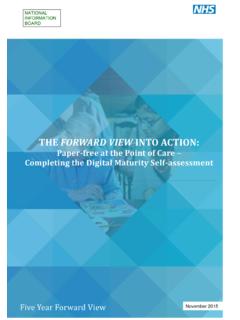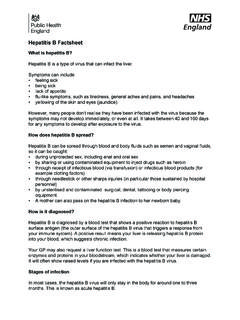Transcription of The power of one, The power of many - NHS England
1 1 THE power OF ONE, THE power OF MANYThe power of one, The power of manyBringing social movemenT Thinking To healTh and healThcare improvemenTDr Jo BibbyDr Helen BevanElizabeth CarterProf Paul Bate Dr Glenn RobertForeword by Helen Bevan Executive Director, Service TransformationNHS Institute for Innovation and Improvement2 THE power OF ONE, THE power OF MANY3 THE power OF ONE, THE power OF MANYThe power of one, the power of manyFirst published March 2009 NHS Institute for Innovation and Improvement:Dr Jo Bibby* Dr Helen BevanElizabeth CarterThe Medical School, University College London:Prof Paul Bate Dr Glenn Robert** Dr Jo Bibby is now Director of Improvement Programmes at the Health Foundation* Dr Glenn Robert is now Senior Research Fellow, National Nursing Research Unit NHS Institute for Innovation and Improvement, 2009 PolicyHR / WorkforcemanagementPlanning / PerformanceClinicalDocument Purpose ROCR Ref:TitleAuthorPublication DateTarget AudienceCirculation ListDescriptionCross RefSuperseded DocAction RequiredTimingContact DetailsEstatesCommissioningIM & TFinanceSocial Care / Partnership WorkingFor informationGateway Ref.
2 10303 The power of one, the power of many NHS Institute for Innovation and Improvement 25 Feb 2009 PCT CEs, NHS Trust CEs, SHA CEs, Care Trust CEs, Foundation Trust CEs , Medical Directors, Directors of PH, Directors of Nursing, Local Authority CEs, Directors of Adult SSs, PCT PEC Chairs, NHS Trust Board Chairs, Special HA CEs, GPs, Emergency Care Leads, Directors of Children s SSsxxxx In order to meet the levels of engagement in quality improvement as set out in the NHS plan, this is a guide which aims to provide knowledge and demonstrate how social movements approaches can be used to deliver improvement at previously unseen levels of depth and Please review and approve in accordance with your guidelines By 25 Feb 2009 Service Transformation NHS Institute for Innovation and Improvement Coventry House University of Warwick Campus, Coventry CV4 7AL 0800 555 550 Copyright NHS Institute for Innovation and Improvement 2009 The power of One, The power of many is published by the NHS Institute for Innovation and Improvement, Coventry House, University of Warwick Campus, Coventry, CV4 7AL.
3 Copyright in this publication and every part of it belongs to the NHS Institute for Innovation and rights reserved. This publication may be reproduced and circulated by and between NHS England staff, related networks and officially contracted third parties only, this includes transmission in any form or by any means, including e-mail, photocopying, microfilming, and recording. All copies of thispublication must incorporate this Copyright of NHS England staff, related networks and officially contracted third parties, this publication may not be reproduced, or stored in any electronic form or transmitted in any form or by any means, either in whole or in part, including e-mail, photocopying, microfilming, and recording, without the prior written permission of the NHS Institute for Innovation and Improvement, application for which should be in writing and addressed to the Marketing Department (and marked re.)
4 Permissions ). Such written permission must always be obtained before any part of this publication is stored in a retrieval system of any nature, or electronically. Any unauthorised copying, storage, reproduction or other use of this publication or any part of it is strictly prohibited and may give rise to civil liabilities and criminal 978-1-906535-82-7dh inFormaTion reader BoX4 THE power OF ONE, THE power OF MANY5 THE power OF ONE, THE power OF MANYS ocial movement thinking: a set of ideas whose time has come?We have reached a seminal point in our health and healthcare improvement the globe, many leaders have transformational ambitions for health and healthcare services.
5 The key issue is not whether the potential for safer, more effective care exists, but how to realise that potential across the entire system for every citizen, every service user and every patient. Are the improvement strategies and approaches that have got us to where we are today enough to deliver that different future?Most ideas that underpin contemporary healthcare improvement are derived from planned or programmatic approaches to change. Within the English National Health Service (NHS), the last 10 years has seen a multitude of improvement programmes and projects, initiated at both local and national level and often with impressive results. However, there is recognition that, on their own, projects and programmes will not deliver the radical and far-reaching changes that are required.
6 In addition to changing structures and processes within healthcare, we need to embrace new sorts of thinking and fresh perspectives to get better, faster, more sustainable ideas and experiences in this report represent nearly seven years of work by the NHS Institute for Innovation and Improvement, its predecessor organisation the NHS Modernisation Agency and our academic partners from the Medical School, University College London. This has been a highly-inclusive process involving hundreds of NHS clinicians and leaders, policy makers, improvement practitioners and social movement researchers from across the world. Feedback has been remarkable. People are genuinely excited about the potency of these ideas and they are already making a difference for scores of local healthcare teams and their work with local NHS teams suggests that a social movement perspective may help to reinvigorate and redefine both large-scale improvement efforts and local front-line change initiatives alike.
7 Social movement thinking is about connecting with people s core values and motivations, and mobilising their own personal energies and drivers for change. This viewpoint is underpinned by solid evidence from the change management field that people change what they do less because they are given an analysis that shifts their thinking, and more because they are shown a truth that influences their feelings. As healthcare leaders, we need the courage to make a personal stand for what is right. We need to make a profound connection with the deep-seated values that brought us and our colleagues into healthcare in the first place forewordHelen BevanThe social movement perspective fundamentally challenges the ways we have learnt to organise and lead change in the NHS.
8 As healthcare leaders, we need the courage to make a personal stand for what is right. We need to make a profound connection with the deep-seated values that brought us and our colleagues into healthcare in the first place. We need to challenge the status quo as necessary and tackle the tough issues head on. At the root of it all, we have to believe that a different future is possible, and that the people we work with and serve have the capability, energy and motivation to deliver the various times in my life, I have been an active contributor to social movements and campaigns. Before I became involved in the NHS social movement work, I often saw myself as an activist outside of my professional life, but applied very different tactics and a different mindset in my NHS role.
9 The most important lesson I have learnt from this social movement initiative is that, as improvement leaders, we need to be activists in our work lives as much, or even more, than in any other sphere of our lives. Our great mission of high quality care for all requires the same passion, commitment and mass participation as any other movement you are a clinician in a front-line patient care role; a trade union activist, or a Chief Executive, I hope you will be energised and inspired by the ideas and experiences in this report. Given the emerging NHS themes of population-based health, localisation, grass roots engagement and individual and community empowerment, perhaps this is a set of ideas whose time has Helen BevanChief of Service TransformationNHS Institute for Innovation and Improvement Before I became involved in the NHS social movements work, I often saw myself as an activist outside of my professional life, but applied very different tactics and a different mindset in my NHS role 6 THE power OF ONE, THE power OF MANY7 THE power OF ONE.
10 THE power OF MANYF oreword by Helen Bevan 1 Starting from a different place 2 A new way of thinking 3 The case for social movement thinking 4 Principle 1: Change as a personal mission 5 Principle 2: Frame to connect with hearts and minds 6 Principle 3: Energise and mobilise 7 Principle 4: Organise for impact 8 Principle 5: Keep forward momentum 9 In closing 10 Appendices: Case Studies References ConTen Ts8 THE power OF ONE, THE power OF MANY9 THE power OF ONE, THE power OF MANYeXeCUTIVe sUmmaryThe power of One, the power of many makes social movement theory more accessible and offers guidance for how managers can incorporate social movement thinking into their organisation so that it can be fully integrated into the everyday.



















